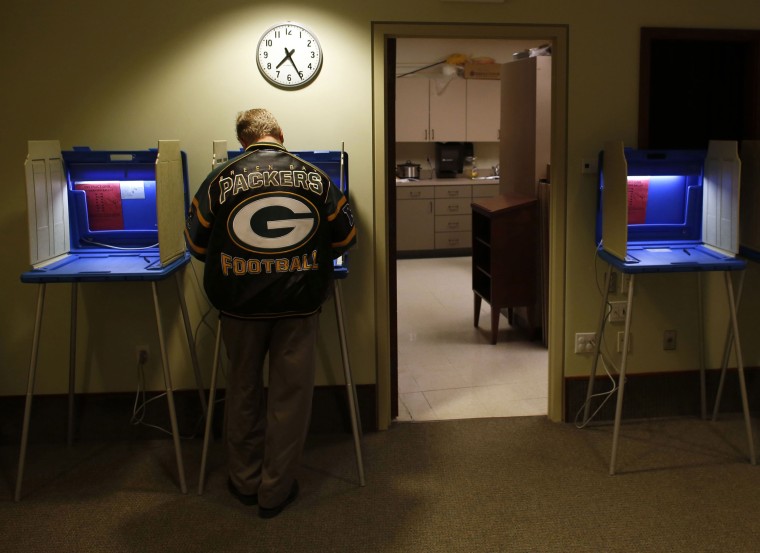Going into yesterday's presidential primaries in Wisconsin, pretty much everyone on both sides knew who was going to win. What was far less clear was how big the victories would be, why that matters, and the extent to which Wisconsin would affect the race overall.
Let's start with the Republican contest, where Ted Cruz's
13-point win exceeded expectations.
Donald Trump's path to the GOP presidential nomination got a little narrower on Tuesday as Senator Ted Cruz handily defeated him in Wisconsin. "Tonight is a turning point," Cruz told supporters. "It is a rallying cry."
Well, maybe. The more the GOP field has narrowed, the more Cruz has consolidated much of the anti-Trump vote. Had Trump won big in Wisconsin, it would have been very difficult to imagine the scenario in which he lost the nomination. Instead, Cruz's easy victory opens the window just a little wider.
The news wasn't all bad for Trump, though. Wisconsin has a modified winner-take-all system in which the candidate who finishes first gets 18 delegates, and then three delegates go to the winner of each of the state's congressional districts. The official tallies are still coming together, but it looks as though Trump will probably win two of those districts, which means he'll walk away from Wisconsin with six delegates. That's not much, but at this point, each delegate counts.
In the broader context, Trump still maintains a sizable advantage over Cruz -- in the delegate count, in the number of raw popular votes, and the number of state victories -- and many of the upcoming contests look favorable for the frontrunner.
So is Wisconsin a speedbump for the Republican favorite or evidence of a Cruz surge? At this point, it's difficult to say with certainty, though last night, if nothing else, created an opportunity for the right-wing Texas senator. Trump's path to 1,237 was difficult before yesterday, it's even more challenging now.
As for Democrats, Sanders went all out to win Wisconsin -- he took full advantage of his massive fundraising to outspend Hillary Clinton in ad buys by a nearly
three-to-one margin -- and the efforts
paid off.
Bernie Sanders picked up a bigger-than-expected win Tuesday in Wisconsin's primary, casting light on Hillary Clinton's lingering vulnerabilities with parts of the Democratic coalition while doing little to slow her path to the eventual nomination. The win will almost certainly translate into a fundraising windfall worth several million dollars for Sanders, and give him a boost of momentum ahead of New York's critical primary two weeks from now. But while the victory keeps Sanders on the path his advisers insist can still lead him to the Democratic nomination, the 15 delegates NBC News projects he will net from Wisconsin will do little to veer Clinton off her course.
I can appreciate why this gets extremely frustrating for Sanders' supporters. In recent weeks, it seems every news report says roughly the same thing: The Vermont senator has scored another impressive victory, which has done little to change the overall race.
The problem for Sanders and his backers is, those reports are accurate. Going into yesterday's primary, the delegate math showed that he would need to win roughly 57% to avoid falling further behind. Sanders did exactly that. But the net gain in the delegate count will probably be about 15, which isn't bad, but which represents only a modest dent in Clinton's overall advantage.
There is no doubt that the Wisconsin results will put even more money in Team Sanders' campaign coffers, and give the entire operation a morale boost. What's more, the campaign will claim the Vermont independent now has "momentum" going into the next round of contests.
But it's not altogether clear "momentum" actually exists in this race, at least in a tangible sense. In the primaries on March 15 and 22, Clinton won six out of eight, including big wins in Florida, Ohio, and Arizona. Did this create a sense of "momentum" that gave her a bounce? Not even a little -- in the seven races that have followed, she's now lost six. Big, impressive victories in some states didn't influence voters' behavior in other states.
The
Washington Post reported this morning, "Momentum
feels important. It feels important to win states, just as it feels important to string together a number of singles and doubles in an inning even if you're trailing by 11 runs. It feels like you're getting somewhere.... But here, in the hard math of the Democratic delegate process, in a series of contests where Clinton has still gotten millions more votes than Sanders -- that momentum is mostly a mirage."
